中考题型经典解法及模拟演练系列之句子运用(含精析)
文档属性
| 名称 | 中考题型经典解法及模拟演练系列之句子运用(含精析) | 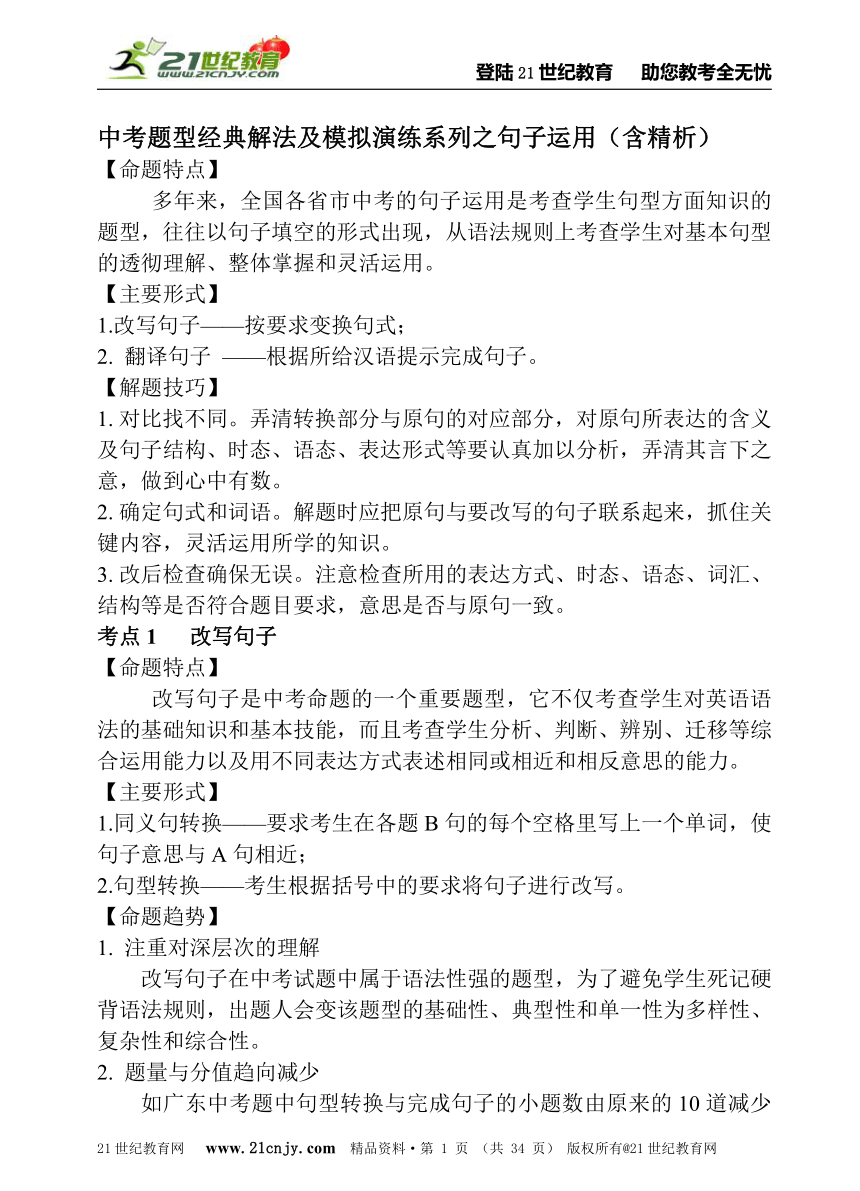 | |
| 格式 | zip | ||
| 文件大小 | 56.0KB | ||
| 资源类型 | 试卷 | ||
| 版本资源 | |||
| 科目 | 英语 | ||
| 更新时间 | 2015-03-08 21:27:21 | ||
图片预览

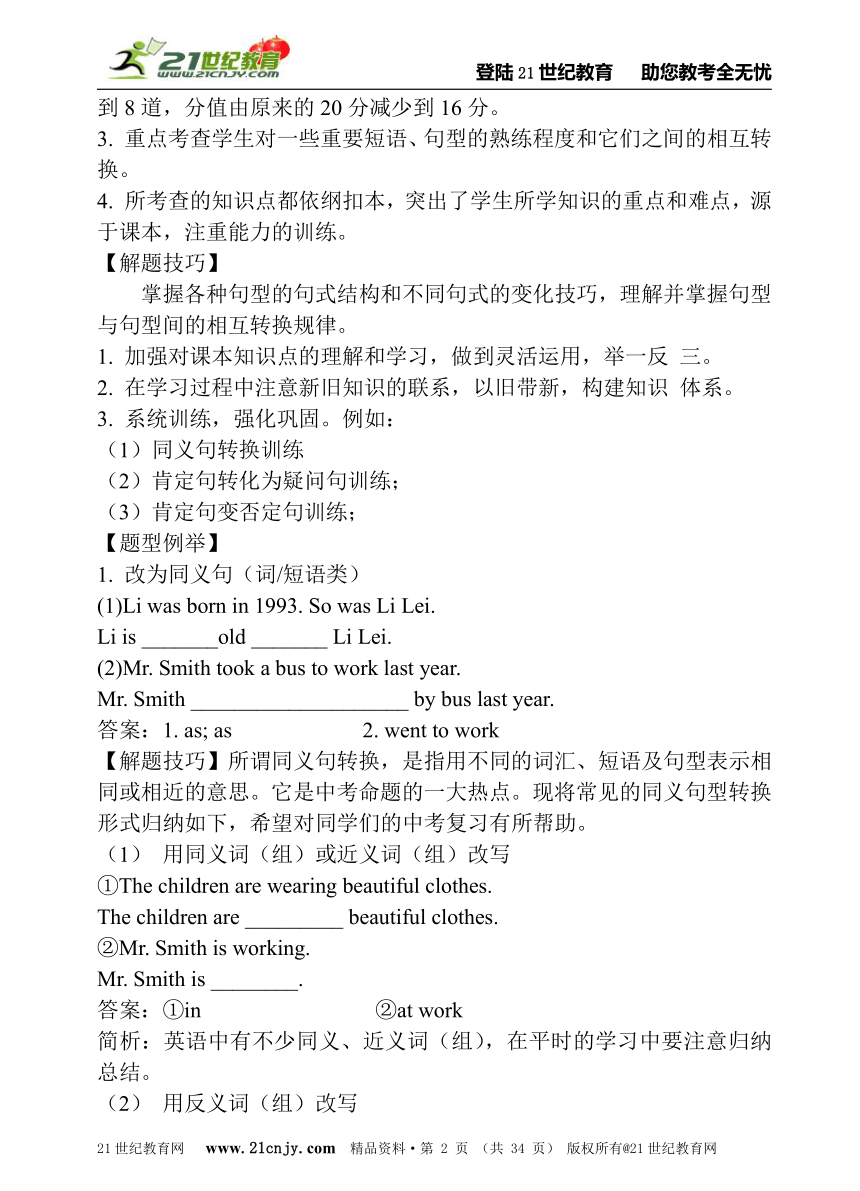
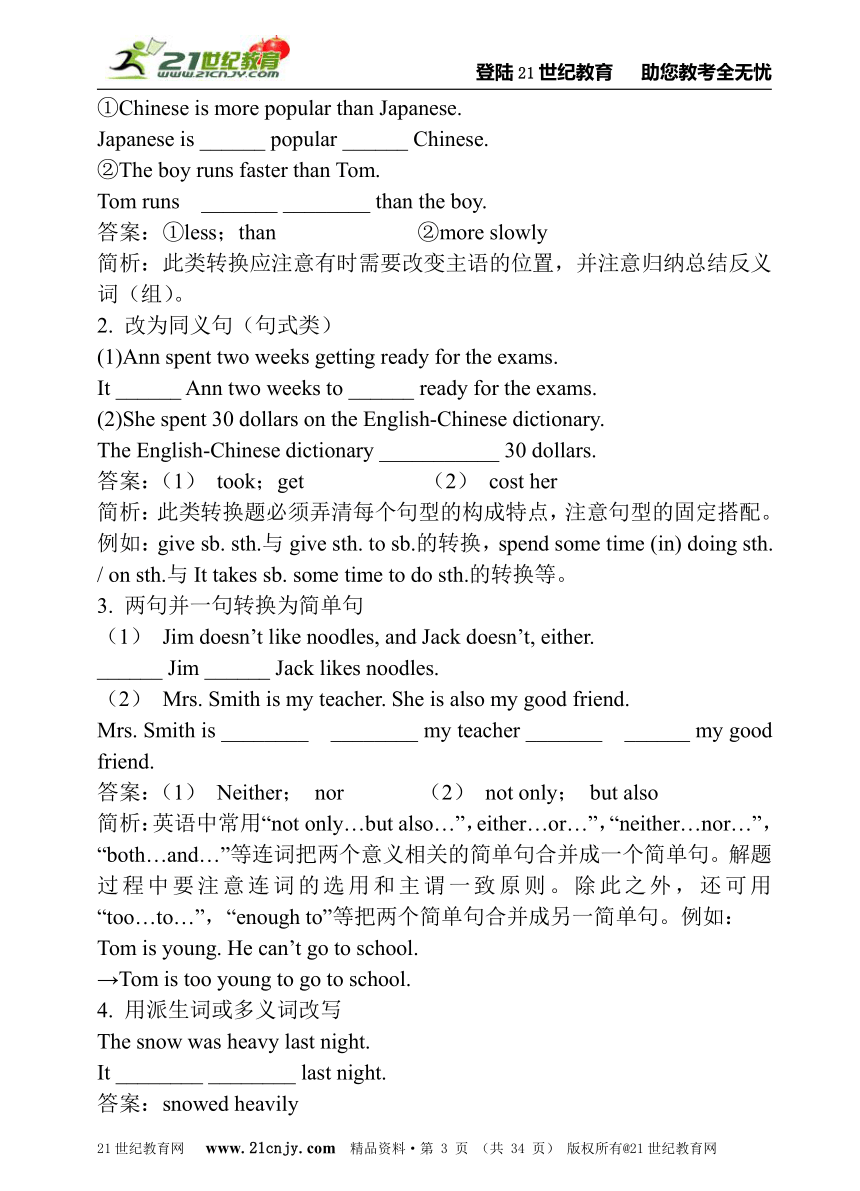
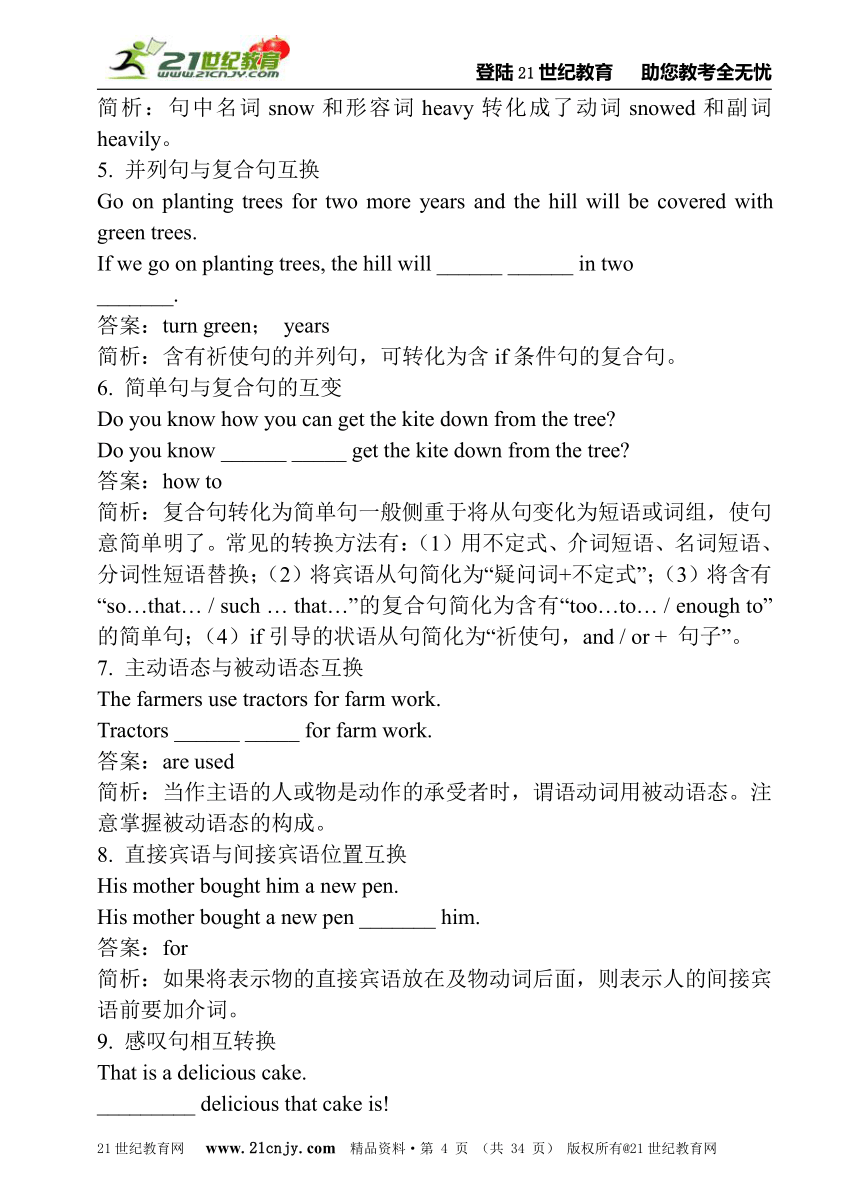
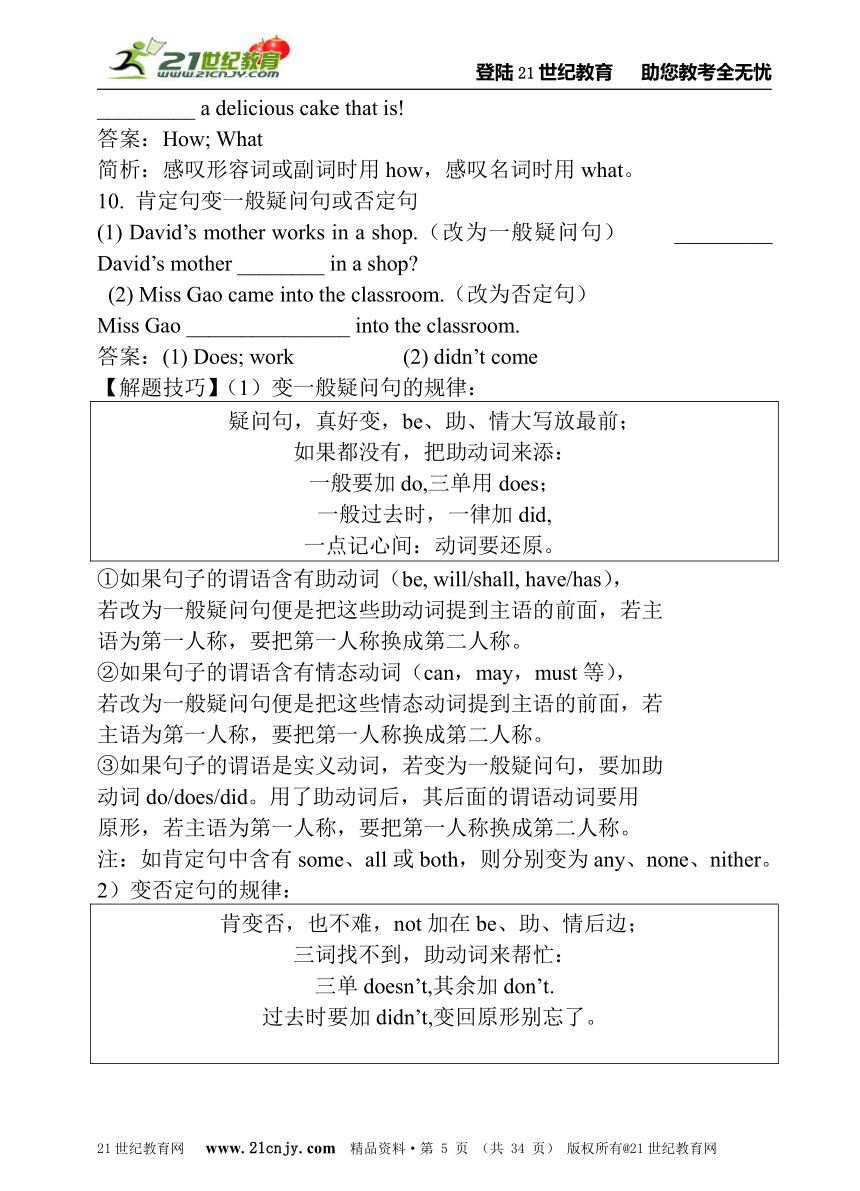
文档简介
中考题型经典解法及模拟演练系列之句子运用(含精析)
【命题特点】
多年来,全国各省市中考的句子运用是考查学生句型方面知识的题型,往往以句子填空的形式出现,从语法规则上考查学生对基本句型的透彻理解、整体掌握和灵活运用。
【主要形式】
1.改写句子——按要求变换句式;
2. 翻译句子 ——根据所给汉语提示完成句子。
【解题技巧】
1.?对比找不同。弄清转换部分与原句的对应部分,对原句所表达的含义及句子结构、时态、语态、表达形式等要认真加以分析,弄清其言下之意,做到心中有数。?
2.?确定句式和词语。解题时应把原句与要改写的句子联系起来,抓住关键内容,灵活运用所学的知识。?
3.?改后检查确保无误。注意检查所用的表达方式、时态、语态、词汇、结构等是否符合题目要求,意思是否与原句一致。?
考点1 改写句子
【命题特点】
改写句子是中考命题的一个重要题型,它不仅考查学生对英语语法的基础知识和基本技能,而且考查学生分析、判断、辨别、迁移等综合运用能力以及用不同表达方式表述相同或相近和相反意思的能力。?
【主要形式】
1.同义句转换——要求考生在各题B句的每个空格里写上一个单词,使句子意思与A句相近;
2.句型转换——考生根据括号中的要求将句子进行改写。
【命题趋势】
1. 注重对深层次的理解
改写句子在中考试题中属于语法性强的题型,为了避免学生死记硬背语法规则,出题人会变该题型的基础性、典型性和单一性为多样性、复杂性和综合性。
2. 题量与分值趋向减少
如广东中考题中句型转换与完成句子的小题数由原来的10道减少到8道,分值由原来的20分减少到16分。
3. 重点考查学生对一些重要短语、句型的熟练程度和它们之间的相互转换。
4. 所考查的知识点都依纲扣本,突出了学生所学知识的重点和难点,源于课本,注重能力的训练。
【解题技巧】
掌握各种句型的句式结构和不同句式的变化技巧,理解并掌握句型与句型间的相互转换规律。
1. 加强对课本知识点的理解和学习,做到灵活运用,举一反 三。
2. 在学习过程中注意新旧知识的联系,以旧带新,构建知识 体系。
3. 系统训练,强化巩固。例如:
(1)同义句转换训练
(2)肯定句转化为疑问句训练;
(3)肯定句变否定句训练;
【题型例举】
1. 改为同义句(词/短语类)
(1)Li was born in 1993. So was Li Lei.
Li is _______old _______ Li Lei.
(2)Mr. Smith took a bus to work last year.
Mr. Smith ____________________ by bus last year.
答案:1. as; as 2. went to work
【解题技巧】所谓同义句转换,是指用不同的词汇、短语及句型表示相同或相近的意思。它是中考命题的一大热点。现将常见的同义句型转换形式归纳如下,希望对同学们的中考复习有所帮助。
(1) 用同义词(组)或近义词(组)改写
①The children are wearing beautiful clothes.
The children are _________ beautiful clothes.
②Mr. Smith is working.
Mr. Smith is ________.
答案:①in ②at work
简析:英语中有不少同义、近义词(组),在平时的学习中要注意归纳总结。
(2) 用反义词(组)改写
①Chinese is more popular than Japanese.
Japanese is ______ popular ______ Chinese.
②The boy runs faster than Tom.
Tom runs _______ ________ than the boy.
答案:①less;than ②more slowly
简析:此类转换应注意有时需要改变主语的位置,并注意归纳总结反义词(组)。
2. 改为同义句(句式类)
(1)Ann spent two weeks getting ready for the exams.
It ______ Ann two weeks to ______ ready for the exams.
(2)She spent 30 dollars on the English-Chinese dictionary.
The English-Chinese dictionary ___________ 30 dollars.
答案:(1) took;get (2) cost her
简析:此类转换题必须弄清每个句型的构成特点,注意句型的固定搭配。例如:give sb. sth.与give sth. to sb.的转换,spend some time (in) doing sth. / on sth.与It takes sb. some time to do sth.的转换等。
3. 两句并一句转换为简单句
(1) Jim doesn’t like noodles, and Jack doesn’t, either.
______ Jim ______ Jack likes noodles.
(2) Mrs. Smith is my teacher. She is also my good friend.
Mrs. Smith is ________ ________ my teacher _______ ______ my good friend.
答案:(1) Neither; nor (2) not only; but also
简析:英语中常用“not only…but also…”,either…or…”,“neither…nor…”,“both…and…”等连词把两个意义相关的简单句合并成一个简单句。解题过程中要注意连词的选用和主谓一致原则。除此之外,还可用“too…to…”,“enough to”等把两个简单句合并成另一简单句。例如:
Tom is young. He can’t go to school.
→Tom is too young to go to school.
4. 用派生词或多义词改写
The snow was heavy last night.
It ________ ________ last night.
答案:snowed heavily
简析:句中名词snow和形容词heavy转化成了动词snowed和副词heavily。
5. 并列句与复合句互换 Go on planting trees for two more years and the hill will be covered with green trees. If we go on planting trees, the hill will ______ ______ in two
_______.
答案:turn green; years 简析:含有祈使句的并列句,可转化为含if条件句的复合句。
6. 简单句与复合句的互变 Do you know how you can get the kite down from the tree? Do you know ______ _____ get the kite down from the tree?
答案:how to
简析:复合句转化为简单句一般侧重于将从句变化为短语或词组,使句意简单明了。常见的转换方法有:(1)用不定式、介词短语、名词短语、分词性短语替换;(2)将宾语从句简化为“疑问词+不定式”;(3)将含有“so…that… / such … that…”的复合句简化为含有“too…to… / enough to”的简单句;(4)if引导的状语从句简化为“祈使句,and / or + 句子”。
7. 主动语态与被动语态互换
The farmers use tractors for farm work.
Tractors ______ _____ for farm work.
答案:are used
简析:当作主语的人或物是动作的承受者时,谓语动词用被动语态。注意掌握被动语态的构成。
8. 直接宾语与间接宾语位置互换
His mother bought him a new pen.
His mother bought a new pen _______ him.
答案:for
简析:如果将表示物的直接宾语放在及物动词后面,则表示人的间接宾语前要加介词。
9. 感叹句相互转换
That is a delicious cake.
_________ delicious that cake is!
_________ a delicious cake that is!
答案:How; What
简析:感叹形容词或副词时用how,感叹名词时用what。
10. 肯定句变一般疑问句或否定句 (1) David’s mother works in a shop.(改为一般疑问句) _________ David’s mother ________ in a shop?
(2) Miss Gao came into the classroom.(改为否定句) Miss Gao _______________ into the classroom. 答案:(1) Does; work (2) didn’t come
【解题技巧】(1)变一般疑问句的规律:
疑问句,真好变,be、助、情大写放最前;
如果都没有,把助动词来添:
一般要加do,三单用does;
一般过去时,一律加did,
一点记心间:动词要还原。
①如果句子的谓语含有助动词(be, will/shall, have/has),
若改为一般疑问句便是把这些助动词提到主语的前面,若主
语为第一人称,要把第一人称换成第二人称。
②如果句子的谓语含有情态动词(can,may,must等),
若改为一般疑问句便是把这些情态动词提到主语的前面,若
主语为第一人称,要把第一人称换成第二人称。
③如果句子的谓语是实义动词,若变为一般疑问句,要加助
动词do/does/did。用了助动词后,其后面的谓语动词要用
原形,若主语为第一人称,要把第一人称换成第二人称。
注:如肯定句中含有some、all或both,则分别变为any、none、nither。
2)变否定句的规律:
肯变否,也不难,not加在be、助、情后边;
三词找不到,助动词来帮忙:
三单doesn’t,其余加don’t.
过去时要加didn’t,变回原形别忘了。
①如果句子的谓语含有助动词(be, will/shall, have/has),其否定形式便是在这些助动词后加not。 ②如果句子的谓语含有情态动词(can,may,must等),其否定形式是直接在情态动词后加not。 ③如果句子的谓语是实义动词,变为否定形式时要加助动词do/does/did的否定形式。用了助动词后,其后面的谓语动词要用原形。
11. 对画线部分提问
(1)There are three people in my family.
_____________ people are there in your family ?
(2)My uncle stayed in Beijing for a week.
______________ did your uncle stay in Beijing?
答案:(1)How many (2)How long
【解题技巧】
划线部分要提问,几个步骤要记准:
先变一般疑问句,再用疑问词替划线,
放到句首要大写,其余依次抄后边;
划线部分别出现,特殊疑问句已变完。
把握常见结构:
(1) 特殊疑问词(不作主语)+一般疑问句语序。
What do you want? 你要什么?
When did you get up this morning? 你今早什么时候起床的?
(2) 特殊疑问词(作主语)+陈述句语序。
Who is dancing over there? 谁在那边跳舞?
Which is yours? 哪个是你的?
总结特殊疑问词:what?,?who?,?when?,?whose?,?where?,?why?,?which?,?how?,?how?old?,?how?many?,?how?much?,?how?long?,?how?often?,?how?soon?,?how?far?,?等。疑问词的确定要根据句中的划线部分作什么成分。上述疑问词的用法主要为:?
what?:用来询问事物、人的姓名和职业。另外,和不同的词一起使用还可询问具体的方面,?
如what?time?询问时间,what?colour?询问颜色等。?who?:用来询问人,尤其指人与人之间的关系。?whose?:用来询问归属,即和人之间的所有关系。?when?:用来询问时间,一般指较大的时间范围。(小范围的时间可用what?time?)?where?:用来询问地点。?which?:用来询问哪一个,主要针对名词的定语提问。?why?:用来询问原因,标志是because?.?how?:用来询问方式、程度。?how?old?:用来询问年龄。?how?many?:用来询问可数名词的数量,其后要接名词的复数形式。?how?much?:用来询问不可数名词的数量,其后要接不可数名词。如单独使用则表示询问多少钱或对事物了解或喜欢的程度。?how?long?:用来询问事物的长度,也可询问时间长度。?
how?often?:用来询问某件事或某个动作在一定的时间范围内重复发生的次数,即频度。?how?soon?:用来询问某件事或某个动作从说话时候起要过多久才会发生,?即询问将来的情况,一般与将来时态连用。?how?far?:用来询问空间距离。
【例题解析】
1.Her?mother?often?gives?her?nice?presents?.(对划线部分进行提问)
精析:本句中的划线部分Her?mother?在句中作主语,因而在确定了疑问词who之后,不用将原句改为一般疑问句,直接替换即可。改写后的句子为:Who?often?gives?her?nice?presents???
2.The?boy?on?the?yellow?bike?is?Lucy's?brother?. (对划线部分进行提问)
精析:本句中的划线部分on?the?yellow?bike?在句中作主语The?boy?的定语,限定是哪一个男孩,因而确定的疑问词是which,?直接替换后的句子为:?Which??boy?is?Lucy's?brother???
3、I?spend??about?half?an?hour??a?day?reading?English?.?
精析:(1)先把原句改为一般疑问句为:Do?you?spend??about?half?an?hour??a?day?reading?English???确定疑问词。
(2)划线的about?half?an?hour?表示一个时间长度,因而疑问词为how?long?.?
(3)把疑问词how?long?放在句首,其后跟上一般疑问句,把划线部分去掉,最终的句子为:?
How?long??do?you?spend?a?day?reading?English??
?4、Our?teacher?will?be?back??in?ten?minutes??.?
精析:(1)先把原句改为一般疑问句为:Will?your?teacher?be?back??in?ten?minutes????
(2)确定疑问词。划线的in?ten?minutes?和一般将来时态连用,表示“在
十分钟后”或“过十分钟”,因而疑问词为how?soon?.?
(3)把疑问词how?soon?放在句首,其后跟上一般疑问句,把划线部分去掉,最终的句子为:?
?How?soon??will?your?teacher?be?back??
模拟演练一
把下列句子改为同义句,每空一词。
1. Mother was busy with some housework when I got home.
Mother was_________ _________some house-work when I got home
2. It took Mary an hour to do her homework last night.
Mary________ an hour _________her homework last night.
3. They made him work 12 hours a day.
He_________ _________ _________ _________ 12 hours a day.
4. I am a League member. He is a League member,too.
_________ he_________ I _________League members.
5. He is so young that he can't join the army.
He is _________ young________ the army.
6. The player smiled and jumped into the river.
The player jumped into the river_________ _________ _________.
7. Mr. Brown left London six years ago.
Mr. Brown _________ _________ _________ _________London for six years.
8. The earth is bigger than the moon.
The moon is _________ _________ _________ _________the earth.
9. He is one of my friends.
He is a friend _________ _________.
10. The teacher told us that we should not meet at the school gate.
The teacher told us_________ _________ _________at the school gate.
11. I have something to tell you. It's interesting.
I have _________ _________ to tell you.
12. I saw them playing basketball there.
I saw _________they_________ _________basketball there.
13. Listen carefully,and you'll become more interested.
_________ _________listen carefully, you'll become more interested.
14. She has been a nurse for five years.
It_________ _________ _________ _________she became a nurse.
15. All are here, but our English teacher isn't.
_________is here _________our English teacher.
16. It was so interesting a film that all of us saw it twice.
It was_________ _________interesting _________that all of us saw it twice.
答案:
1. busy doing 2.spent;on/doing 3. was made to work 4. Both;and;are 5. too;to join 6. with a smile 7. has been away from 8. not as/so big as 9. of mine 10. not to meet 11. something interesting 12. that;were playing 13. If you 14. is five years since 15. Everyone/Everybody,except/but 16. such an;film
模拟演练二
1.It?rained?heavily?yesterday?morning.(改为感叹句)
??___ ___ it?rained?yesterday?morning!
2.The?girl?is?my?cousin.The?girl?is?wearing?glasses.(改为定语从句)
The?girl______?_______?wearing?g1asses?is?my?Cousin.
3.The?boy?is?too?young?to?go?to?schoo1.(改为同义句)
The?boy?isn’t________??_______to?go?to?school.
4.The?teacher?asked?me,“Will?you?be?a?volunteer?”(改为间接引语)
The?teacher?asked?me?if_____?____?be?a?volunteer.
5.I?will?go?to?Canada?to?visit?my?uncle?in?three?days.(对划线部分提问)
???____?____will?you?go?to?Canada?to?visit?your?uncle?
6.Coaches came into use?in 1958. ?(对划线部分提问) __________ __________ coaches come into use? 7.He is so energetic that he can be our leader. (改为简单句) He is energetic __________ __________ be our leader. 8.“Have you finished the report?” I asked him. (改为间接引语) I asked him __________ __________ had finished the report. 9.Mike, you mustn’t show off before others when you have success. (改为祈使句) Mike, __________ __________ off before others when you have success. 10.He often writes the words “best wishes” at the end of his letters. (改为被动语态) The words “best wishes” __________ often __________ by him at the end of ?his letters.
11.She has a new bike.(改为否定句) She ____ ____ a new bike. 12.They are English.(同义句转换) They are ____ ____. 13.My sister is?eleven.(对画线部分提问) ____ ____ is your sister? 14. Tom has big eyes.(改为一般疑问句) ____ Tom ____big eyes? 15.They are?their?apples.(对画线部分提问) ____ ____ are these? 16."Jack, can you help with the dinner?" Jack's mother asked.(改成间接引语) Jack was asked ______________he ______________help with the dinner. 17. Peter does well in basketball. He does well in football, too.(合并成一句)? ?Peter does?well?in ______________basketball?______________football. 18.The girl didn't know where he could find her mother.(改成简单句)? ?The girl didn't know where______________??? ______________her mother. 19.He forgot to turn off the light and left.(同义句转换) ?He left ______________the light______________. 20.We should allow the students to tell their own ideas.(改成被动语态)? The students should______________????? ______________to tell their own ideas.
21.The old man is so angry. He can't say a word.(连成一句) The old man is ______ ______ ______say a word. 22.I bought the bike ten years ago. (同义句) I ______ ______the bike ______ ten years ago. 23.The key is used for?locking the front door.(就划线部分提问) ?______? _______ the key ______for? 24. You should hang the curtains across the stage.(改为被动语态) The curtains _______ ______ ______across the?stage. 25. Our school has changed greatly in the past several years.(同义句) There ______ ______ great changes in the past several years.
26.I usually use the computer to search for information.? (对划线部分提问) ???_______do you usually use the?computer _______? 27.Can you show me how l can get to the railway station?? (改成同义句) Can you show me? _______? _______ get to the railway station? 28.The job is very important. You must finish it on time.? (将两句合并成一个句子) It is? _______an important?job?? _______you must finish it on time. 29.They have been marred for fifteen years.? (改成同义句) They?? _______ _______fifteen years ago. 30.We will donate all the money to Project Green Hope.? (改成被动语态) All the money will? _______?? _______ to Project Green Hope.
31.This book is not useful for today's students. (同义句)
This? book is _______for today's students. 32. Mary has been in Hong Kong for a month. (同义句) Mary_______? Hong Kong a month ago. 33. In the past people thought the earth was flat. (同义句) People???_______?to think the earth was flat. 34.The family didn't have enough money to send her abroad. (同义句) The family couldn't??_______? to send her abroad. 35.There were about fifteen people in the room, and most of them were women. (同义句) There were about fifteen people in the room,??_______? women.
36.They went to Shanghai last week. (? 完成反意疑问句) They went to Shanghai last week,____ _____?? 37.She may be at home now. (同义句) ______ she ____ at home now. 38.People will use the subway more.(改为一般疑问句)? ______ _____ use the subway more? 39. I don’t like swimming very much.? Swimming _______ my ________ sport. (同义句) 40.Why don’t you play basketball ?(同义句) _____ ______play basketball ?
41.Mike went there by bus(改为一般疑问句) __________Mike _________there by bus? 42.It’s?Sunday?today(对划线部分提问) __________ ________is it today? 43.Did they go out for a walk after supper?(作否定回答) No, _______? ________ 44. What animal do you like best?(同义句转换) ___________is your __________animal? 45.The boys went to play soccer last week.(改为现在进行时) ?The boys__________? ________________soccer now.
答案1.?How?heavily
2.?who/that?is
3.?old?enough
4.I?would
5.?How?soon
【精析】
1.?句型考查题。所给句子句意为:昨天早晨下大雨了。改为感叹句的句意为:昨天早晨雨下得真大啊!?感叹句句型为:What(a/an)+形容词+名词+(主谓)!;How+形容词/副词+(主谓)!感叹副词heavily要用how.所以答案是How?heavily。
2.?句型考查题。所给句子句意为:这个女孩是我的表妹。这个女孩戴着眼镜。要求改为定语从句,先行词是The?girl?,且关系代词在从句中做主语,所以关系代词要用who或者that,从句用原来句子的时态。所以答案是?who/that?is。????
3.?句型考查题。所给句子句意为:这个男孩太小而不能上学。too…?to意为“太……而不能”经常和“not?+形容词+enough?to?do”或者“so…that…”转换同义句。由空格后的“to?go?to?school”to?do不定式,可知不能用“so…that…”。所以答案是old?enough。??????
4.句型考查题。所给句子句意为:老师问我们,“你将做志愿者吗?”间接引语的语序要用陈述句语序,由主句用了过去时,可知从句用相应的过去时。所以答案是I?would。????????
5.?句型考查题。所给句子句意为:三天后,我将去加拿大拜访叔叔。对in+时间段表示“……后”,要用How?soon提问。????
6.When did 7.enough to 8.if/whether he 9.don’t show 10.are, written 【精析】
6.对于询问时间用when开头,再根据句意看,时间应该为一般过去时,用did帮忙,故为When did 7.enough修饰形容词放在形容词或是副词的后面,后接不定式,表示足够…做某事,故为enough to 8.我问他是否已经完成了这个报告。if 意为是否,引导宾语从句,后面用过去的相应时态用过去完成时,故为if/whether he 9.麦克,当你成功时不要在别人面前炫耀自己的自己的成功。祈使句用don’t加动词原形构成,故为don’t show 10.本句用被动形式,一般现在时的被动形式为is/are+过去分词,本句中用are written. 11.doesn’t have?? 12. from England 13.How old 14.Does; have?? 15.Whose apples 【精析】 11.主语为单数第三人称,一般动词的否定形式在动词前加doesn’t,后跟动词原形have,故本题空格处填doesn’t have。?? 12.本题的含义为他们来自于英国,故空格处填from England。?? 13.本题画线的是年龄,对此提问用多大年龄How old。?? 14.主语为单数第三人称,谓语动词为一般动词,一般疑问句在句首加does,后改为动词原形,故本题空格处填Does; have。?? 15.对修饰名词的形容词性物主代词提问用所属代词whose,后跟名词,故本题空格处填Whose apples。
16.if/whether; could?? 17.both; and?? 18.to find?? 19.with: on?? 20.be allowed 【精析】
16.宾语从句的用法,引语部分是一般疑问句,所以要用if/whether来引导。如果主句是一般过去时,宾语从句要用过去的时态,在此用过去式形式。
17. both A and B“ 两者都”
18.由特殊疑问词做连接词引导的宾语从句,在换成简单句时,使用连接词+不定式。
19.使用介词短语做伴随状语。
20.情态动词的被动语态。
21.too angry to 22.have had since 23.What is used 24.should be hung 25.have been 【精析】 21.本句的含义为那个老人太生气了而不能说一句话,too……to表示太……而不能的含义,angry表示生气的含义,故本题空格处填too angry to。 22.本句的含义为自从十年以前我就已经有了自行车,主句不能用短暂动词buy,只能用have的相应形式,故本题空格处填have had since。 23.对事情提问的可用疑问词what,后跟一般疑问句,be动词is提前,故本题空格处填What is used。 24.被动句的结构为be+过去分词,hang的过去分词为hung,故本题空格处填should be hung。 25.本题的含义为在刚过去的几年,我们的学校已经有了巨大改变,there be 的完成结构为there have been,故本题空格处填have been。
【精析】 26.对事物提问的用what,后跟一般疑问句,故本题空格处填What for。 27.疑问词how后跟动词不定式to do可用来代替宾语从句,故本题空格处填how to。 28.本题的含义为这是一个如此重要的工作以至于你必须要按时完成,such……that表示如此……以至于的含义,such后跟名词,故本题空格处填such that。 29.本题的含义为他们在15年前结婚的,用got married表示过去结婚的,故本题空格处填got married。 30.被动句的结构为be+动词过去分词,故本题空格处填be donated。
【精析】useless???reached??used??afford??mostly
31.本题的含义为这本书对今天的学生没有用,有用的否定前缀词为useful。 32.本题的含义为玛丽一个月前到达香港,reach可以表示到达的含义,故本题空格处填reached。 33.本题的含义也可以为人们曾今认为地球是圆的,used to表示曾经或以前的含义,故本题空格处填used。 34.本题的含义也可以为家人承担不起送她到国外去,afford表示卖得起的含义,故本题空格处填afford。 35.本题的含义也可以为在房间里有大约15个人,大部分为妇女,mostly表示大部分的含义,故本题空格处填mostly。
36.didn’t? they? 37.Maybe, is 38.Will,people 39.isn’t,favorite? 40.Why,not 【精析】 36.本题改为反义疑问句,前句是肯定,后半句用否定结构,本题是过去时,故用didn’t,后跟人称代词they,故本题空格处填didn’t? they。? 37.表示可能性用于句首可用副词maybe表示有可能的含义,句子中主语为单数第三人称,故be动词用is,故本题空格处填Maybe, is。? 38.含有助动词will的句子改为一般疑问句,将助动词will直接提前,故本题空格处填Will,people? 39.本题的含义为游泳不是我最喜欢的,主语为单数第三人次,故用isn’t,favorite表示最喜欢的含义,故本题空格处填isn’t,favorite。? 40.表示建议why don’t you可以缩写成why not后跟动词原形,故本题空格处填Why,not。
41.Did,go? 42.What day_ 43.theydidn’t? 44.What favorite 45.are playing 【精析】41.本句为过去时,动词为一般动词改为一般疑问句,需在句首加助动词did,后跟动词原形go,故本题空格处填Did,go。? 42.对星期几提问可用what day,意思为今天是星期几,故本题空格处填What day。 43.一般疑问句的否定回答为no,人称代词they+引导词的否定结构didn’t,故本题空格处填they didn’t。? 44.本句的含义也可以为你最喜欢的动物是什么,favorite表示最喜欢的,故本题空格处填What favorite。?? 45.用现在进行时改写,现在进行时的结构为be+现在分词doing,故本题空格处填are playing。
?考点2 句子翻译
【命题特点】
该题型也叫完成句子,在历年中考题中都占很大比重。尽管有个别地市淘汰了该题型,但大部分省市仍然采用,如北京、天津、山东烟台等。往往给出两个句子,其中第一句是汉语,第二句英语设一空或多空,所填一空一词或一空多词。但有不少中考题要求翻译整个句子,这点难度很大。一般说来,句子翻译都有明显的考查意图,要么是考查某个词的用法或习惯表达,要么是考查某个句型的结构或搭配,或者是考查某条语法规则的具体运用等。
【解题技巧】
1.要明确命题意图。在做题时若能明确命题者的考查意图,那么便可加强做题的针对性,从而做到有的放矢。
2.要注意英语的习惯表达以及英汉两种语言的不同之处。 由于历史、文化等方面的原因,英汉两种语言在用词选句等方面有许多不同之处,这一点考生一定要给予足够的重视,千万不要用汉语的习惯硬套英语句型。例如:汉语中常说“希望/建议/拒绝某人做某事”,但英语习惯上却不用hope/suggest/ refuse sb. to do sth.; 汉语中的“红茶”,在英语中是black tea,而不是对应地说成red tea;汉语的“踢足球”和“打篮球”,分别要用“踢”和“打”,且习惯上不能替换(即不说“打足球”和“踢篮球”),但在英语中既不用kick(踢), 也不用beat (打),却通用一个play。所有这些方面的基础语法知识和习惯用法,同学们在复习应考过程中都要特别注意。
3.不要逐字翻译。不少同学在做翻译练习中往往有逐字翻译的习惯。例如:当他要翻译“他年龄很大”这样一个极为简单的句子时,他往往会逐字译为His age is very big. ,而不是正确地译为He is old.。 又如:要翻译“我工作很忙”,他不是正确地译为I’m busy.,而是逐字译为My work is very busy.所有这些问题考生在复习应考中都要予以充分重视。
4.由于句子翻译一般采用翻译填空的形式,也就是说被填空的句子在句法结构或表达形式等方面已有了一定的限制,所以考生在做这类题时不仅要注意所给的中文句子的含义,而且要注意已给英语句子的结构和所使用的句式等,做到既不偏离中文含义,又符合英语表达的习惯性和地道性。
【例题解析】
1. 当他听到这个好消息时,激动得说不出话来。
He was _______ when he heard this good news.
【解析】此题易误填 too excited not to say anything或very excited that he couldn’t say anything。这是受汉语思维的影响造成的。too…to…结构本身已有否定的意义,不定式符号to前面不能再用not。so…that…是一个固定句型,其中so不能改为very或quite。正确答案为too excited to say anything或so excited that he couldn’t say anything或so excited that he could say nothing。
2. 我不知道他喜欢什么。
I don’t know _______.
【解析】此题易误填 what does he like。这是由于句式不分引 起的。单独说What does he like?肯定没错,可是这个句子 在这里充当know的宾语,是一个宾语从句。凡是从句都要用 陈述语序。正确答案为what he likes。
3. 花应该经常浇水。
Flowers _______.
【解析】此题易误填 should often water。这是受汉语思维的 影响造成的。汉语中很少使用被动句,而英语中使用频繁,这里应该使用被动语态。正确答案为should often be watered。
4. 他父亲曾经是司机。
His father _______.
【解析】此题易误填 once was driver。这是受汉语思维的影响造成的。汉语中没有“冠词”,因此很多同学漏掉了单数可数名词前面的不定冠词。正确答案为used to be a driver。
模拟演练三
根据句意和汉语提示写出单词,完成句子。每空一词。 1.当琳达听到这个好消息的时候,情不自禁地笑了。 When Linda heard the good news, she couldn’t ___________ ___________.? 2.格林夫妇计划去某个轻松的地方度假。 The Greens are planning to go _____________ _____________ for vacation.? 3.他父亲对他做得事情感到自豪。 His father __________ great ___________ in what he has done.? 4.我宁愿去登山,也不愿意在家看电视。 I’d rather go ____________ than ____________ TV at home.? 5.到目前为止,我们班接近三分之二的学生参加了俱乐部。 So far, nearly two ___________ of the students in our class have ____________ the PE club.
6.I plan to go on a trip in _______ (七月). 7.After the whole day’s voluntary work, I felt fine ________ (除之外) for being a little tired. 8.The show I’m a singer helps audience rediscover many good _____________(嗓音). 9.To keep fit, we should have more vegetables and fruit _______ (代替) of too much meat. 10.The world is _______(充满) of chances, and we must make a quick decision when we meet one. 11.熊猫主要以竹子为食。 Pandas mainly_________ ___________bamboo. 12.托尼的书在2012年出版了。 Tony’s book _________ ____________ in 2012. 13.开始我不太喜欢这个工作。 I didn’t like the?job?very much ______ _________. 14.我想去澳大利亚观光。 I’d like to_________ ___________ in Australia. 15.全世界人民热爱和平。 People _________ __________the world love peace.
16.我相信我们的中国梦一定会实现。? I believe our Chinese dreams will ____________ _____________. 17.杰克很外向,也很容易相处。 Jack is very outgoing and easy to get ____________ ______________.? 18.我们愿意保护濒临灭绝的野生动物。 We’re willing to __________ ______________ wild animals.? 19.他们正在组织一场才艺表演为慈善事业筹款。 They’re organizing a talent show to ____________ ______________ for charity.? 20.哈维的母亲找到了一些适合他读的书籍。 Harvey’s parents found some books ____________ ___________ him to read.? 21.简每周至少去图书馆两次。 Jane goes to the library _______ _______ twice a week. 22.许多青少年过于依赖父母。 Many teenagers _______ _______ their parents _______ _______. 23.王奶奶提醒我不要接近那条狗。 Grandma Wang warned me _______ _______ _______ near the dog. 24.当迈克尔醒来时,妈妈正在收拾屋子。 Mum _______ ________ _______ the house when Mike woke up. 25.我期待生日那天收到他的礼物。 I _______ _______ _______ _______ a present from him on my birthday.
26.今天下午我们将一起去北京。? We’ll go to Beijing _______ ________ this afternoon. 27.开始他们有点儿紧张。? _______ ________ they were a little nervous. 28.王老师说他会帮助我们克服数学难题。? Mr Wang said he would _______ us________ with maths problems. 29.那个外国朋友给了他许多礼物,比如:钢笔、小刀、帽子等。? The foreign friend gave him lots of presents, _____ _____ a pen, a knife, a hat on so on. 30.李华一回到教室就看见了他的书包在地上放着。? Li Hua found his bag lying on the floor ____ ______as he came back to the classroom.
31.The policeman asked him what ___________ _____________(发生) him 32.It seems difficult for us to (切碎) the onions. 33.How to design our uniforms shouldn’t only (取决于) what we likes and dislikes. 34.Could you tell me whether this pair of shoes (由…制成的)of leather? 35.The newspaper China Daily (值得) reading..
36.在我外出期间,你介意为我照看一下宠物狗吗? Would you mind????????? my pet dog for me while I am away? 37.作为一名学生,你必须按时上交作业。 As a student, you must???????????? your homework on time. 38.《伊索寓言》向我们讲述许多有教育意见的故事。 Aesop’s Fables tells us a lot of?????????????? . 39.许多鸟常年舒服地生活在自然保护区里。 Many birds live comfortably in the nature reserve??????????? . 40.《江南Style》这首歌不仅在韩国而且在世界其它地方也流行。 The song Gangnam Style is popular????????? in Korea???????? in other parts of the world.
41.亲爱的伙伴们,让我们坚持追求梦想,总有一天我们会梦想成真。 My dear friends, let’s ______ ______ to our dreams, and they may just come true some day. 42.那个小孩在登山中意外地摔伤了腿。 That child broke his leg ___________ ___________ when he was climbing the mountain. 43.上个月, 南方部分地区的天气真是糟糕啊! ___________ terrible weather it was in some parts of southern China last month! 44.如今很流行的“大学游”对青少年来说是很有教育意义的。 University Tours, which are quite popular these days, are very___________ to teenagers. 45.不论发生任何事,我都不会改变心意。 ___________ happens, I won’t change my mind.
46.离开课室时请关灯。 Please_______ ________ the lights when you leave the classroom. 47.踢完足球后,他太兴奋了睡不着。 After the football game, he was__________ excited_________ sleep. 4.8你的手好脏啊!快去洗! _________ __________ your hands are! Go and wash them now. 4.9在中国到处都有人打羽毛球。 In China, badminton_________ __________ everywhere. 50.你知道在哪里买这种邮票吗? Do you know_________ __________ __________ this kind of stamp??
参考答案
1.help/stop laughing 2.somewhere relaxing 3.takes,pride 4.climbing,watch 5.thirds,joined 【精析】
1.couldn’t help doing sth.=couldn’t stop doing sth.表示“情不自禁做某事,忍不住做某事”。 2.形容词修饰不定代词要后置。 3.take pride in=be proud of意为“对……感到自豪”。 4.would rather do sth. than do sth.表示“宁愿做……而不愿意做……”。 5.表示分数时分子用基数词,分母用序数词,分子等于等于二的情况下分母用复数。Join指加入人群、组织或团体并成为其中的一员,take part in 指参加某项活动。
6.July 7.except 8.voices 9.instead 10.full 【精析】 6.句意:我计划在七月去旅行。结合语境及汉语提示,可知填专有名词July,七月。注意首字母大写。 7.句意:在一整天的义务劳动之后,除了感觉有点累之外,我感觉很好。结合语境及汉语提示,可知填介词except。 8.句意:我是歌手这个节目有助于观众们再发现许多不错的歌声。结合语境及汉语提示,可知填复数名词voices。 9.句意:为了保持健康,我们应该多吃蔬菜和水果,而不是吃太多的肉。结合语境及汉语提示,可知填副词instead,代替。 10.句意:这个世界充满了机会,当我们遇到时,我们必须立即做出决定。结合语境及汉语提示,可知填形容词full,充满的。
11.live on 12.came out 13.at first 14.go sightseeing 15.all over 【精析】 11.考察短语live on以……为食,靠……生活。结合语境可知本句描述的是客观性动作,故用一般现在时态。主语pandas是复数形式,故谓语动词用原形。 12.考察短语came out出来,出版。结合语境可知本句描述的是过去某时发生的动作,故用一般过去时态。 13.考察副词短语at first,首先,最初。 14.考察短语go sightseeing去观光。本句中to是不定式符号,后面动词用原形。 15.考察短语介词all over到处,遍及。
16.come true 17.along/on with 18.protect endangered 19.raise money 20.suitable/fit for? 【精析】 16.come true意为“实现”,无被动形式。 17.get along with=get on with与……相处。 18.be willing to do sth.意为“愿意做某事”后面加动词原形。 19.raise money表示筹钱。 20.suitable/fit for sb.意为“适合某人”。 21.at least 22.depend on;too much 23.not to go 24.was tidying up 25.look forward to getting/receiving 【精析】 试题分析: 21.考察短语at least至少; 22.考察短语depend on,依靠,依赖;too much,太多。本句描述的是客观性动作,故用一般现在时态。主语teenagers为复数,故谓语动词用原形。 23.考察非谓语动词。Warn后接带to的不定式做宾语补足语,其否定表达是在to的前面加not,故填:not to go 24.考察短语tidy up收拾,整理。结合语境可知本句描述的是现在正在进行的动作,故用现在进行时态。 25.考察短语look forward to 盼望,注意to是介词,后面接名词或者动名词作宾语。
26.all together; 27.At first; 28.help out; 29.such as; 30.as soon. 【精析】 试题分析: 26.考察短语all together,一起,一道,同时. 37.考察短语At first;首先. 28.考察短语help out;支援,帮助……解决问题。 29.考察短语such as;比如,诸如。 30.考察短语as soon as一……就。 31.happened to 32.cup,up 33.depend,on 34.is,made 35.is,worth 【精析】 31.句意:警察问他他发生了什么事。结合语境可知本句宾语从句中描述的是过去发生的动作,故用一般过去时态。短语 sth happen to sb某人发生了某事。故填过去式动词happened to。 32.句意:切碎这些洋葱对我们来说好像很难。本句中to是不定式符号,后面接原形动词,结合语境及汉语提示,可知填原形动词cup,up。 33.句意:如何设计我们的校服不能仅仅取决于我们的喜好。本句should是情态动词,后面动词用原形。结合语境及汉语提示,可知填原形动词depend,on。 34.句意:你能告诉我这双鞋是否是用皮革制成的吗?结合语境可知宾语从句中描述的是客观性状态,故用一般现在时态。主语是动作对象,故用被动语态。根据汉语提示,可知填is,made。 35.句意:报纸中国日报值得一读。句式be worth doing值得做某事。结合语境及汉语提示,可知填is,worth。 考点:词汇基础及词形变化 点评:解答此类题型首先要根据句子中的关键信息,如:首字母,汉语提示,上下文,句意,习惯搭配等,判断出所需单词。然后根据该单词在句子中的句子成分,所起作用,确定单词词形,进行适当词形变化。36.looking after/ taking care of/ caring for 37.hand in 38.educational stories/ tales/ fables 39.all(the) year (round/ around) the whole year 40.not only; but(also)/ both; and 【精析】 36.考察短语look after/ take care of/ care for,照顾,关系。注意mind后面一般接动名词做宾语,表示介意做某事。 37.考察短语hand in叫上,提交。注意情态动词must后面动词用原形。 38.考察名词性短语educational stories/ tales/ fables有教育意义的故事。 39.考察短语all(the) year (round/ around) the whole year,常年,整年。 40.考察并列短语not only; but(also)不但……而且;both; and……和……都。
41.hold on 42.by accident 43.What 44.educational/ instructive 45.Whatever 【精析】 41.考察短语hold on?坚持,注意let后接不带to的不定式做宾语补足语。 42.考察短语by accident偶然,以外地; 43.考察感叹句。感叹句主要有what和how构成:1、what修饰名词或名词短语,有以下两种形式: 1. What+a(an)+(形容词)+单数可数名词+主语+谓语!或是:What+名词词组+主语+谓语! 2. What+(形容词)+可数名词复数或不可数名词+主语+谓语! 2、How引导的感叹句。 how用来修饰形容词、副词或动词。其结构是:How+形容词(副词)+主语+谓语!根据下文terrible weather it was ,可知填:What多么。 44.考察形容词educational/ instructive,有教育意义的。 45.考察连词Whatever,无论什么。 46.turn off 47.too,to, 48.How dirty, 49.isplayed 50.where to buy 【精析】
46.考察短语turn off关掉,关闭。注意英语祈使句中动词一般用原形。 47.考察短语too,to,太……而不能。 48.考察感叹句。感叹句主要有what和how构成: 1、what修饰名词或名词短语,有以下两种形式: 1. What+a(an)+(形容词)+单数可数名词+主语+谓语!或是:What+名词词组+主语+谓语! 2. What+(形容词)+可数名词复数或不可数名词+主语+谓语!? 2、How引导的感叹句。 how用来修饰形容词、副词或动词。其结构是:How+形容词(副词)+主语+谓语! 根据下文your hands are!可知填:How dirty, 49.考察时态及语态。结合语境可知本句描述的是客观性动作.故用一般现在时态。主语是动作对象,故用被动语态。主语badminton是单数吗,故助动词用is,填is played。 50.考察不定式短语。疑问词加不定式,可以起相当于宾语从句的作用,结合语境可知从句对地点提问,故疑问词用where,填where to buy,去哪儿买。
模拟演练四
根据所给汉语完成下列句子,词数不限。
1.很抱歉我没能参加你的生日晚会。 _____for missing your birthday party. 2.你在课余时间喜欢读书吗? Do you _____ in your spare time? 3.杰克会和同学们相处得很好。 Jack will _____ his classmates. 4.这个演讲非常精彩。我们都听得很认真。 The speech _____ we all listened carefully. 5.他们很难在这么短的时间内想出新的办法。 _____ a new way in such a short time.
6.这本新杂志将在月底出版。 _____________________________________________________________ 7.扬州机场已经投入使用一年多了。 _____________________________________________________________ 8.我们应该多关心那些需要帮助的孩子们。 _____________________________________________________________ 9.我们所需要的一切就是有足够的钱来继续我们的工作。 _____________________________________________________________ 10.生活在乡下对我来说是件惬意的事。 _____________________________________________________________11._________ is my favorite TV program. (动物世界)? 12.It’s polite to keep our voice down ____________. (在公共场合) 13.The world is thirsty, so we should _________ in our daily life. (节约水)? 14.Sarah loves her dog very much. She always regards it as her ________. (家庭成员)? 15.The great artist ___________ his amazing use of colors and shapes. (以……而闻名)
16.从现在开始,请每个人小心保管自己的物品。 Everyone, ___________________________________ from now on. 17.李小姐会弹钢琴,但她不会唱歌。 Miss Li___________ piano,___________sing.
18.那是因为你不够仔细。 ___________________________________ enough. 19.我盼望着假期的到来。 ___________________________________ my holiday. 20.好漂亮的城市! ___________________________________?city?!
21.为什么不问问那边的警察呢? ____________ ask the policeman over there? 22.莎士比亚不仅是作家还是演员。 Shakespeare was ____________ an actor. 23.今年夏天他们将去英国观光。 They ____________ in Britain this summer. 24.我花了两小时完成了这项工作。 It ____________ the work. 25.我经常帮助妈妈在家打扫卫生。 I often ____________ at home.
26.他需要一个安静的房间休息。 He needs a? ____________to have a rest. 27.我们不仅要学习现代科技,还要关注传统文化。 We should not only learn the modern technology but also pay attention to ____________culture. 28.有些城市禁止在公共汽车上吃食物。 In some cities, it is not allowed to eat?? ____________ . 29.在你生气的时候请不要做任何决定。 Please don’t ____________ when you are angry. 30.她在英语方面比她弟弟好得多。 She is much? ____________at English than her brother.
31.The second step of making a banana?milk?shake is cutting up the bananas. _____________________________________________________________ 32.Teachers often tell us to think more of others instead of caring only about ourselves. _____________________________________________________________ 33.每天按时到校是一个好习惯。 _____________________________________________________________ 34.在过去的几年里我的生活发生了很大的变化。 _____________________________________________________________ 35.如果你坚持你的梦想,终有一天它会成真。 _____________________________________________________________
36.学英语最好的方法就是尽可能地多说。
_____________________________________________________________
37.污染问题如此严重,以至于更多措施应该采取来阻止它。
_____________________________________________________________
38.对于我们来说,帮助需要帮助的人是有意义的。
_____________________________________________________________
39.越来越多的人开始意识到健康的重要性。
_____________________________________________________________
40.如果继续砍伐树木,动物将无处可住。
_____________________________________________________________
41.我们正盼着过周末呢。
_____________________________________________________________
42.她让我一连说了45分钟。
_____________________________________________________________
43.你要是见到他,就把这个便条给他。
_____________________________________________________________
44.小孩最终被找到了,安然无恙。
_____________________________________________________________
45.对她来说,像以前那样经常与她父母亲见面就难了。
_____________________________________________________________
参考答案
1.I am sorry 2.like reading 3.get along/on well with 4.was so wonderful that 5.It’s difficult for them to come up with 【精析】 1.此题考查固定句型结构be sorry for doing sth表示因做某事而感到抱歉。for是介词其后可跟名词,代词或动名词。 2.此题考查固定句型结构like doing sth表示喜欢做某事 3.此题考查固定句型结构get along well with sb表示与某人相处的非常好相当于get on well with sb。 4.此题考查固定句型结构so… that表示如此…以至于…so的后面要跟形容词或副词。 5.此题考查固定句型结构it is+形容词 for sb to do sth表示对某人来说做某事怎样 6.The new maganize will come out at the end of this month. 7.The airport in Yangzhou/ Yangzhou Airport has been in use/ service for over/ more than a year. 8.We should care more about the children in need. 9.All we need is enough money to carry on with/continue/go on with our work. 10. It’s pleasant/ a pleasant thing for me to live in the country/countryside./Living in the country is a pleasant thing for me. 【精析】 6.考察短语come out出来,出版。 7.考察短语in use/ service,在使用中。 8.考察短语carry on with/continue/go on with继续,继续做某事。注意with是介词,后面接名词作宾语。 9.考察短语care more关心;in need.困难的,需要帮助的。 10.考察强调句式It is adj for sb to do sth,做某事对某人来说怎么样。本句中it是形式主语,指代后面不定式内容做形式主语。本题也可用动名词做主语的形式,注意动名词做主语表示抽象动作。
11.Animal World 12.in public/in public places 13.save water 14.family member 15.is famous for/is known for
【精析】
11.句意:动物世界是我最喜欢的电视节目。结合语境及汉语提示,可知填Animal World,专有名词,注意首字母大写。 12.句意:在公共场合,低声说话是礼貌的。结合语境及汉语提示,可昨天副词短语in public/in public places,公开的/在公众场合。 13.句意:这个世界太缺水了,因此在我们的日常生活中应该节约用水。结合语境及汉语提示,可知填save water。Should是情态动词,后面动词用原形即可。 14.句意:萨拉非常喜欢她的狗。她总是把它当做她的家庭成员。结合语境及汉语提示,可知填名词短语family member。 15.句意:这个伟大的画家以他对于颜色和形状的出色应用而闻名。结合语境可知本句描述的是客观性状态,故用一般现在时态。主语The great artist是单数第三人称,故谓语动词用单数。短语be famous for以某事出名。结合语境及汉语提示,可知填is famous for/is known for。
16.…please be careful with your things… 17.…can/is able to play the…, but she can't/isn't able to… 18.That's because you were not careful… 19.I'm looking forward to… 20.What a beautiful… 【精析】
16.考察短语be careful with 小心,照顾。注意英语祈使句中谓语动词一般用原形。 17.考察并列句。注意but一般谓语句子中间,表示转折关系。 18.考察宾语从句。注意宾语从句与主句时态没有必然联系,许结合语境具体分析。本句从句中描述的是过去的状态,故用一般过去式。 19.考察短语look forward to盼望。注意to是介词,后面接名词或者动名词作宾语。 20.考察感叹句。:感叹句主要有what和how构成: 1、what修饰名词或名词短语,有以下两种形式: 1. What+a(an)+(形容词)+单数可数名词+主语+谓语!或是:What+名词词组+主语+谓语! 2. What+(形容词)+可数名词复数或不可数名词+主语+谓语!? 2、How引导的感叹句。 how用来修饰形容词、副词或动词。其结构是:How+形容词(副词)+主语+谓语!city为单数名词,故填what a beautiful。 21.why not? 22.not only a writer but also 23.will go sighting 24.took me two hous to finish 25.help my mother do some cleaning 【精析】 21.考察固定句式why not do sth,为什么不做某事,表示用来提出某种建议等,注意not后面接动词原形. 22.考察固定短语not only……but also,不但……而且……。 23.考察短语go sighting去观光。结合语境可知本句描述的是将来发生的动作,故用一般将来时态。 24.考察take用法。take 用于 it takes sb ... to do sth句型,仅指花费时间(three hours等),必须用it作形式主语,指代下文不定式内容; 25.考察短语do some cleaning,做清洁工作。注意help后面接不带to的不定式做宾语补足语。 26.quiet room 27.traditional 28.in(on) the bus /in(on) a bus/in(0n) buses 29.make a decision/make (any) decisions 30.better at 【精析】
26.结合语境可知填名词性短语quiet room,安静的房间。做宾语。 27.结合语境可知填形容词traditional,传统的,做定语。 28.结合语境可知填介词短语in(on) the bus /in(on) a bus/in(0n) buses,在公交车上。注意在表示在某个位置时,介词一般不能直接和单数名词连用。 29.考察短语make a decision/make (any) decisions,做决定。注意祈使句的否定表达是,don’t+原形动词。 30.略
31.制作香蕉奶昔的第二步是将香蕉切碎。 32.老师常常告诫我们要多为别人着想,而不要只是关心自己。 33.It’s a good habit to get to school on time every day. 34.My life has changed a lot in the last/past few years. ?(Great changes have taken place in my life in the last/past few years.) 35.If you hold on to your dream, it will come true one day. 【精析】
31.考察动名词的翻译,动名词做句子成分表示反复发生的抽象动作,起语法功能相当于名词。短语cut up切碎。 32.考察非谓语动词的翻译,不定式作宾语补足语表示具体的将要进行的动作,动名词表示抽象动作,。短语instead of代替,反而。? 33.考察强调句式, It is adj for sb to do sth,做某事对某人来说怎么样。I短语get to school 到校;on time按时; every day每天。 34.考察现在完成时态。结合语境可知本句描述是现在已经完成的动作,故用完成时态,主语谓语动词和的选择及主谓一致问题。Change改变,take place 发生。 35.考察状语从句。注意当主句描述将来动作时,英语条件状语从句中用一般现在时态表示将来动作,短语hold on坚持,come true实现,成为现实。
36.The best way to learn English is to speak as much as possible. 37.The pollution is so serious that more actions should be taken to prevent/stop it. 38.It’s meaningful for us to help people in need. 39.More and more people start to realize the importance of health. 40.If we continue to cut down trees, animals will have nowhere to live/have no place to live in. 【精析】
36.考察动词不定式做定语,表语及短语as much as possible尽可能的。注意动词不定式做句子成分表示具体的将要进行的动作。 37.考察固定句式so……that……,如此……以至于。 38.考察强调句式, It is adj for sb to do sth,做某事对某人来说怎么样。本句中it是形式主语,指代后面不定式内容做形式主语。 39.考察动词不定式作宾语及介词of的用法。 40.考察条件状语从句,动词不定式做定语及短语cut down砍伐。注意当主句描述将来动作时,条件状语从句中一般用一般现在时态表示将来动作。动词不定式做定语表示具体的将要进行的动作。 41.We are looking forward to the weekend. 42.She kept me talking for forty-five minutes. 43.If you see him,give him this note. 44.The child was finally found safe and well. 45.It’s difficult for her to see her parents as often as before. 【解析】略
同课章节目录
- 词法
- 名词
- 动词和动词短语
- 动词语态
- 动词时态
- 助动词和情态动词
- 非谓语动词
- 冠词
- 代词
- 数词和量词
- 形容词副词及其比较等级
- 介词和介词短语
- 连词和感叹词
- 构词法
- 相似、相近词比较
- 句法
- 陈述句
- 一般疑问句和否定疑问句
- 特殊疑问句及选择疑问句
- 反意疑问句
- 存在句(There be句型)
- 宾语从句
- 定语从句
- 状语从句
- 主谓一致问题
- 简单句
- 并列句
- 复合句
- 主谓一致
- 主、表语从句
- 名词性从句
- 直接引语和间接引语
- 虚拟语气
- 感叹句
- 强调句
- 倒装句
- 祈使句
- 句子的成分
- 句子的分类
- 题型专区
- 单项选择部分
- 易错题
- 完形填空
- 阅读理解
- 词汇练习
- 听说训练
- 句型转换
- 补全对话
- 短文改错
- 翻译
- 书面表达
- 任务型阅读
- 语法填空
- 其他资料
